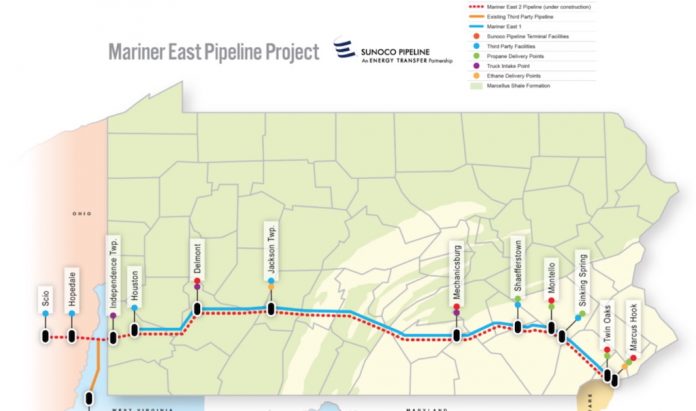HARRISBURG, Pa. — The Pennsylvania Department of Environmental Protection (DEP) has reached an agreement with environmental groups that will allow Sunoco’s Mariner East 2 pipeline project to proceed.
The DEP, the Clean Air Council (CAC), Mountain Watershed Association (MWA), and the Delaware Riverkeeper Network (DRN) settled their appeal of 20 permits issued to Sunoco Pipeline, LLP (Sunoco) for the Mariner East 2 pipeline.
The proposed pipeline will transport natural gas liquids from Ohio and the Pittsburgh area to Sunoco’s Marcus Hook Facility in Delaware County. More than 80 percent of the Mariner East 2 pipeline will follow the same pipeline corridor as Mariner East I. The pipeline will traverse 17 counties in the southern tier of Pennsylvania.
The settlement does not alter any of the 20 permits in the appeal. Each permit was issued after an environmental review involving approximately 35 DEP and County Conservation District staff over the course of nearly two years.
Since the permits were issued, however, DEP has developed new standards, protocols, and best practices designed to protect the environment during the construction and installation of pipelines.
“DEP is pleased that we were able to reach an amicable agreement with the appellants, resolving all claims related to the issuance of these permits while incorporating new processes to ensure that future pipeline projects learn from the mistakes made by Sunoco in implementing this project,” said DEP Secretary Patrick McDonnell.
In the settlement, DEP committed to continue to develop and implement further enhanced procedures for environmental protection associated with the construction of natural gas pipelines in Pennsylvania in collaboration with the appellants.
Rocky history
Sunoco’s construction activities resulted in an unpermitted discharge of drilling fluids to wetlands, wild trout streams, and High-Quality Waters at a number of locations in Allegheny, Blair, Cambria, Cumberland, Dauphin, Huntingdon, Indiana, Lancaster, and Washington counties in violation of its permits and the Clean Streams Law. In each instance, Sunoco was required to halt operations, remediate the impacts, and submit proposed modifications to its construction methodologies to DEP for approval. Sunoco was allowed to resume operations only after DEP reviewed and approved Sunoco’s proposed modifications.
Most of the penalty amount, $337,724, went to the Clean Water Fund, with the remainder used to reimburse the county conservation districts in the impacted counties for costs incurred inspecting the various impacted sites. This penalty is in addition to the $12.6 million penalty levied against the company in February and covers separate violations.










